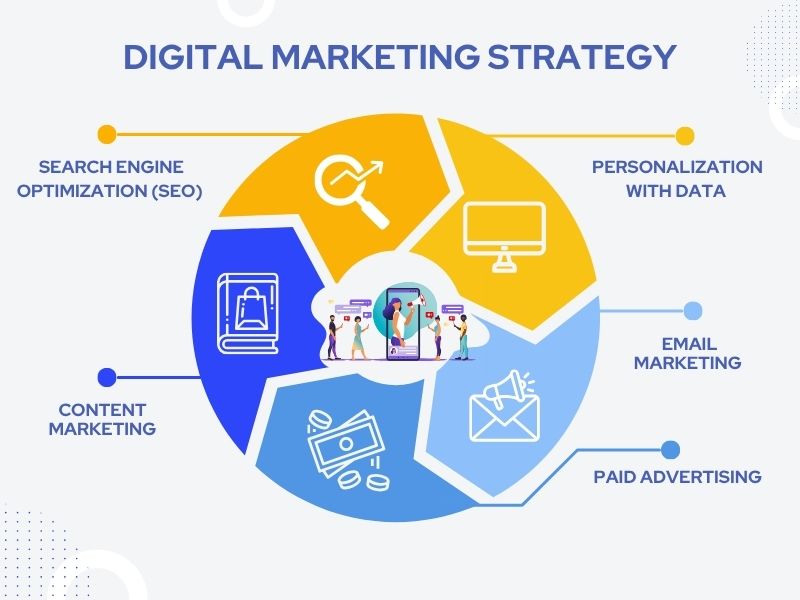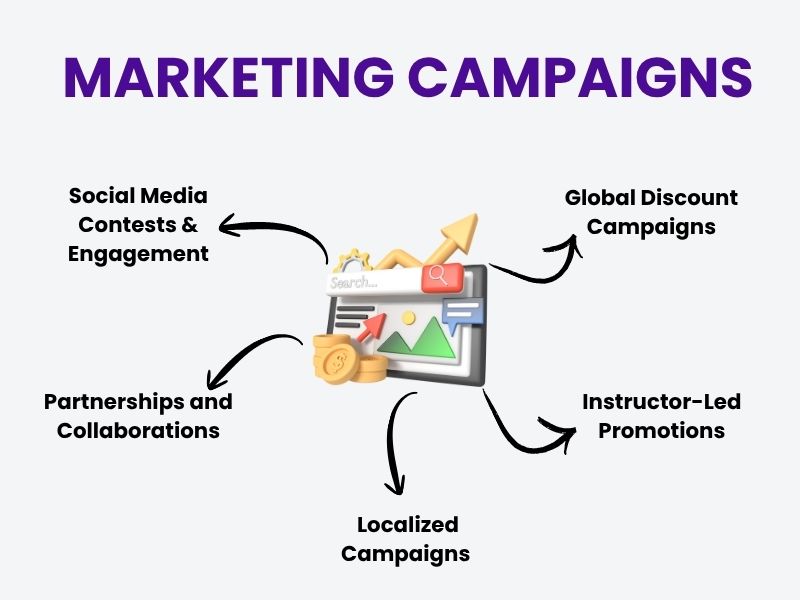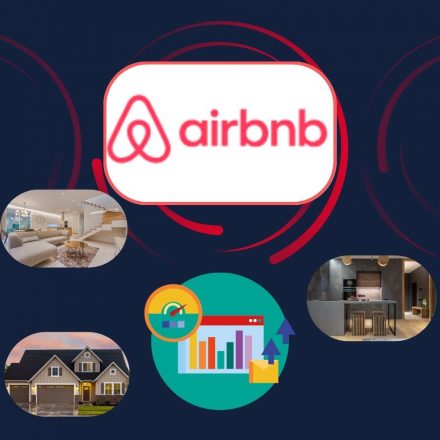Learning new skills no longer requires a classroom or a physical textbook. From coding and design to personal development, everything is now just a few clicks away. Among all the online platforms, Udemy stands out as one of the most popular, and the marketing strategy of Udemy plays a major role in that success.
With thousands of courses and millions of students worldwide, Udemy’s growth didn’t happen by accident. Behind its success lies a smart and well-executed marketing strategy that keeps learners coming back and instructors signing up to teach.
Understanding how Udemy markets itself gives a peek into the playbook of a global education brand. It’s a mix of clever planning, digital mastery, and creative campaigns that work together to build trust and engagement.
This breakdown uncovers the marketing strategy of Udemy, highlighting how it promotes its platform, attracts its audience, and stays ahead in the competitive world of online learning.
What is the Marketing Strategy of Udemy?
The marketing strategy of Udemy revolves around one powerful idea: make learning accessible to everyone, everywhere. Instead of only targeting tech-savvy professionals, Udemy opens the door to learners of all kinds, from stay-at-home parents to college students to busy working adults.
Udemy positions itself as a global marketplace, not just a course provider. That means it doesn’t create all the content itself. Instructors from around the world build their own courses and sell them on the platform. Udemy simply becomes the bridge, helping both sides meet. This clever model reduces content costs while increasing variety.
The company focuses heavily on data. By studying user behavior, it shows the right courses to the right people at the right time. This personalized approach increases engagement and boosts course sales without feeling pushy.
On top of that, pricing plays a major role. Most courses are extremely affordable and often discounted. Combined with limited-time offers, this strategy creates a sense of urgency and draws in budget-conscious learners.
In short, the marketing strategy of Udemy is all about being inclusive, affordable, flexible, and smart with data. That’s how it continues to grow in a competitive e-learning world.
Marketing Mix of Udemy
Udemy’s success comes from a balanced marketing mix, also known as the 4Ps: Product, Price, Place, and Promotion. These four elements work together like gears in a machine, keeping the platform running smoothly and growing fast.
Product
Udemy offers one of the largest collections of online courses. From Excel spreadsheets to meditation, there’s something for almost everyone. Unlike traditional education platforms, Udemy doesn’t control the content creation; it gives instructors the freedom to design and sell their own courses. This leads to massive variety and a steady flow of fresh content.
Price
Pricing on Udemy is flexible and highly student-friendly. In the marketing strategy of Udemy, low course prices and frequent discounts play a key role, with many courses dropping to a fraction of their original cost during promotions. A course that usually costs $100 might be offered for $12.99 during a promotion. This discount-heavy approach appeals to bargain hunters and encourages impulse purchases. Students feel like they’re getting high value without breaking the bank.
Place
Udemy is a digital-first platform, which means everything happens online. Courses can be accessed anytime, anywhere; on mobile, desktop, or tablet. This flexibility makes learning convenient, especially for those juggling work, school, or parenting.
Promotion
The marketing strategy of Udemy places a strong focus on digital promotion, using email marketing, SEO, paid ads, and strategic partnerships to connect with learners across the globe. Instructors are also encouraged to promote their own courses using coupons and referral links. This two-sided marketing model helps boost reach without heavy spending.
Each part of Udemy’s marketing mix plays a key role in attracting and retaining both students and instructors. It’s a system that’s constantly being optimized for better results.
Digital Marketing Strategy of Udemy
The backbone of Udemy’s growth lies in the smart digital approach within the marketing strategy of Udemy. Rather than relying on traditional ads or cold calls, the platform connects with learners where they already spend their time: online. Every click, scroll, and search is part of a bigger plan to connect people with the right course.

Here’s how it all comes together:
Search Engine Optimization (SEO)
When someone types “how to learn Excel” or “beginner Python course” into Google, Udemy wants to show up first. That’s why SEO is a key part of the strategy.
Course titles, product descriptions, and even user reviews are carefully optimized to rank well on search engines. This brings in organic traffic visitors who land on the site naturally, without seeing an ad.
Email Marketing
Udemy sends a lot of emails, but not the annoying kind. These emails are personalized based on user behavior.
If someone browsed marketing courses last week, they might receive a limited-time offer for a top-rated course in that category. These emails are short, helpful, and often include irresistible discounts that turn interest into action.
Paid Advertising
While organic traffic drives steady growth, the marketing strategy of Udemy also includes investing in paid ads across platforms like Google, Facebook, Instagram, and YouTube to reach a wider audience quickly. These ads often showcase bestselling or trending courses, with limited-time deals to create urgency.
The targeting is razor-sharp. Ads are shown based on location, interests, and browsing history, so they feel more helpful than intrusive.
Content Marketing
Instead of only pushing sales, Udemy uses content marketing to help people learn. Blogs, course previews, and instructor interviews share tips, insights, and a behind-the-scenes look at what’s offered.
This approach builds trust, especially with first-time visitors, and helps them feel confident before signing up.
Personalization with Data
One of Udemy’s hidden strengths is how well it uses data. Every interaction helps shape the experience, what courses are recommended, what offers are shown, and what emails are sent.
This level of personalization keeps users engaged and makes the platform feel like it “gets” them, which boosts conversions without needing hard sales tactics.
Udemy’s digital marketing strategy isn’t about being everywhere; it’s about being relevant. It meets learners online with the right message, at the right moment, through the right channel.
Marketing Campaigns by Udemy
Udemy doesn’t just rely on digital channels to grow; it also rolls out clever marketing campaigns that grab attention and drive serious results. These campaigns are often fun, data-driven, and tailored to different regions and audiences.

Here’s a look at some of the key types of campaigns Udemy runs:
Global Discount Campaigns
One of the standout tactics in the marketing strategy of Udemy is its large-scale discount events. These typically take place during major seasons such as Black Friday, New Year, or Back-to-School periods, drawing huge numbers of learners eager for a bargain.
Courses that normally cost $100 or more suddenly drop to $9.99 or $12.99. These sharp discounts create urgency and push many users to finally enroll in the course they’ve been eyeing for weeks.
It works because it feels like a great deal, like buying a course for the price of a sandwich.
Instructor-Led Promotions
As part of the marketing strategy of Udemy, instructors are encouraged to promote their own courses. They receive tools like custom discount coupons, referral links, and promotional landing pages to help boost enrollments.
This approach is a smart part of the marketing strategy of Udemy, as it helps increase visibility without extra ad spending. Instructors gain more sign-ups, and students often trust recommendations directly from the course creators.
It’s a win-win setup that expands Udemy’s reach through its own teaching community.
Localized Campaigns
The marketing strategy of Udemy avoids a one-size-fits-all approach. For different regions, it runs localized campaigns in the native language, tailored to cultural preferences, pricing sensitivity, and local trends.
For example, a digital skills campaign in India might focus on job readiness, while a campaign in Brazil could highlight creative or personal development topics.
This customization helps the platform feel more relatable and relevant, no matter where the user is located.
Partnerships and Collaborations
As part of the marketing strategy of Udemy, the platform partners with businesses, universities, and governments to launch large-scale learning initiatives. These collaborations often promote Udemy Business or offer customized course bundles designed specifically for organizational training needs.
One example includes companies offering free Udemy courses as part of employee training programs. This not only boosts branding but also introduces the platform to thousands of professionals.
Social Media Contests & Engagement
From time to time, Udemy runs contests or challenges on platforms like Instagram or Twitter. These encourage users to share their learning goals, course experiences, or achievements.
It’s not just marketing, it’s building a community. When learners post about their journey, it naturally promotes the platform in an authentic, user-generated way.
Through smart campaigns, whether global or local, the marketing strategy of Udemy keeps users engaged, instructors motivated, and brand awareness growing. Every campaign is crafted with the learner in mind, which is why they continue to make an impact.
Conclusion
Udemy’s journey from a small startup to a global learning platform wasn’t just about offering online courses; it was about knowing how to market them smartly.
By focusing on affordability, accessibility, and personalization, Udemy built a marketing strategy that speaks directly to its audience. Whether it’s through SEO, emails, paid ads, or massive discount campaigns, every move is designed to connect learners with the right content.
Its marketing mix blends strong products, flexible pricing, and wide availability with sharp promotions. Add to that its localized approach and instructor-driven model, and it’s clear why Udemy continues to grow in such a competitive space.
Behind the scenes, data drives most of the decisions in the marketing strategy of Udemy, helping tailor everything from course recommendations to email campaigns. Instead of sticking to one formula, Udemy adapts its approach based on who it’s targeting and where.
In the end, the marketing strategy of Udemy proves that understanding your audience and staying flexible is the real key to standing out in the digital learning world.
















Leave a Comment